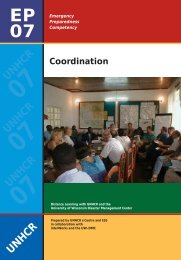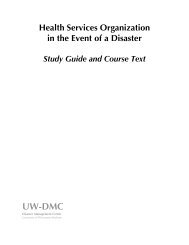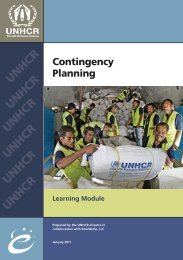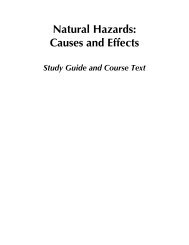Managing External Relations - Disaster Management Center ...
Managing External Relations - Disaster Management Center ...
Managing External Relations - Disaster Management Center ...
Create successful ePaper yourself
Turn your PDF publications into a flip-book with our unique Google optimized e-Paper software.
Chapter 3<br />
The UN Secretariat is composed of a variety of departments, sections, and units working<br />
in political and economic analysis, social development, peacekeeping operations, humanitarian<br />
and legal affairs, and other fields. The various components of the Secretariat fall<br />
under the direct supervision of the Secretary General as the chief administrative officer of<br />
the UN. Secretariat Departments are normally headed by an Under-Secretary General<br />
(USG). The main players in complex emergencies are the Office for the Co-ordination of<br />
Humanitarian Affairs (OCHA), the Department of Political Affairs (DPA), the Department<br />
of Peacekeeping Operations (DPKO), the UN Security Coordinator (UNSECOORD), and the<br />
Office for Legal Advice (OLA).<br />
The Inter-Agency Standing Committee (IASC) is chaired by the UN Emergency Relief<br />
Coordinator who is also the USG heading OCHA, and includes FAO, UNDP, UNHCR,<br />
UNICEF, WFP and WHO as full members. OHCHR, IFRC, ICRC, IOM, the Special Representative<br />
of the SG for IDPs, and representatives from several NGO consortia (e.g. ICVA,<br />
SCHR, and InterAction) are standing invitees of the IASC. The IASC ensures inter-agency<br />
decision making in response to complex emergencies primarily by developing and<br />
agreeing on system-wide humanitarian policies; allocating responsibilities among agencies<br />
in humanitarian programmes; advocating common humanitarian principles to parties<br />
outside the IASC; identifying areas where gaps in mandates or lack of operational<br />
capacity exist; building consensus between humanitarian agencies. It also addresses other<br />
policy issues of special concern to the membership. These include, improving security of<br />
relief personnel and supplies, the effects of UN sanctions, demobilisation of combatants,<br />
improving system-wide resource mobilisation, field co-ordination of humanitarian<br />
assistance and ensuring the transition from relief to rehabilitation and development.<br />
The Executive Committee on Humanitarian Affairs (ECHA), is one of the four<br />
Committees created by the Secretary General in the framework of the UN reform with<br />
the aim of enhancing the co-ordination between UN Agencies in various fields. Chaired<br />
by the Emergency Relief Coordinator, ECHA includes UNDP, UNICEF, WFP, OHCHR, DPKO,<br />
DPA, UNRWA and the Special Representative of the SG for Children in Armed Conflicts.<br />
ECHA’s membership, notably with the participation of UN Departments, adds a political/<br />
military dimension to humanitarian consultations.<br />
Other Key Counterparts<br />
International Red Cross and Red Crescent Movement<br />
The International Red Cross and Red Crescent Movement consists of three primary elements: The<br />
International Committee of the Red Cross (the founder of the movement), the International Federation<br />
of Red Cross and Red Crescent Societies (IFRC), and the various national Red Cross and Red<br />
Crescent Societies.<br />
In its relations with the ICRC, UNHCR maintains a constant shared interest in the protection of<br />
human rights. Particularly in complex emergencies where there are both refugees and active conflict,<br />
the UNHCR and ICRC often work side by side. Strict adherence to the principle of neutrality on the<br />
part of ICRC, however, at times restricts that organisation from co-ordinating closely with and<br />
sharing information on their operations. In general, co-ordination between the two organisations is<br />
supported by both and continues to develop positively.<br />
The IFRC co-ordinates a very large network of national societies and their local volunteers who<br />
can mobilise quickly to respond locally to large-scale disasters and population displacements. ‘More<br />
than 60% of the International Federation’s operations involve assistance to populations on the<br />
EP<br />
04<br />
41








